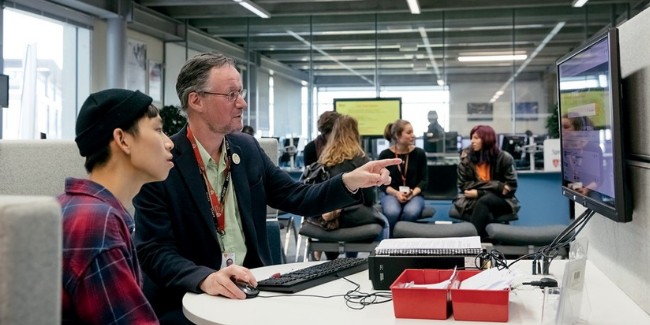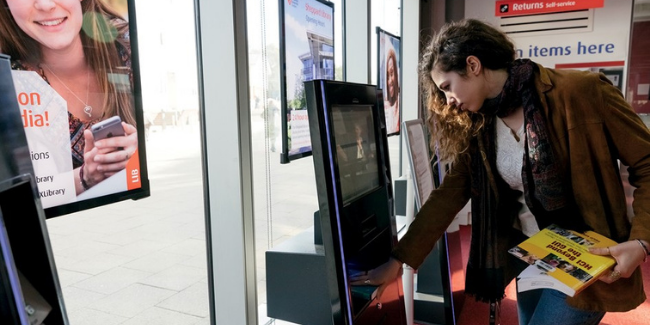
The last five years have seen mounting evidence of the need for universities in the UK to increase their care for the mental health and well-being of their students. Matthew Lawson, Director, Library and Student Support at Middlesex University,
talks to Rob Green about how the institution responded to mental health issues among students.
Nearly one in three UK university students professionally diagnosed with a mental health condition according to as this year’s annual National Student Survey run by the Office for Students.
It also found that more than half of UK university and college students feel their mental wellbeing
has not been supported enough this year.
The pandemic has clearly accelerated student mental health issues, and the consequences are highly troubling. The effects of Covid-19 have led to more than a fifth of students surveyed now taking medication for their mental health, and
nearly a quarter now requiring mental health counselling or therapy. It is also very concerning that a fifth of students have found they are more likely to depend upon alcohol or recreational drugs, due to pandemic stress.
Matthew Lawson, Director, Library and Student Support at Middlesex University, says there has been a recognition in recent years of the importance of being able to support students. The pandemic has made matters worse for many students,
and Matthew says: “There has definitely been an increase in students and staff mental health concerns over the past five years and that was before the added pressures brought by the pandemic. “Students are facing pressures that I certainly
didn’t have when I was at university. The financial and social challenges that many of our students have to deal with can interfere with their capacity to focus on their studies. Mental health support has become an important part of
student support services across the sector as we recognise the role of universities in the holistic development and equipping of students for life beyond higher education alongside the need for responsive and safe support.
Designated Safeguarding Officers (DSOs)
The university has understood the need for support networks to help students and staff who are suffering with mental health issues. A number of safeguarding officers are in place across the university and these staff members are able to
coordinate and deliver support where and when it is needed.
Matthew said: “We are in the fortunate position at Middlesex of having a well-established approach to student safeguarding. This includes a network of Designated Safeguarding Officers (DSOs) comprising volunteers from across the services
and faculties, including several from Library and Student Support (LSS). This has helped to provide a consistent approach to dealing with complex cases and also to embed understanding of the issues across the university.”
That network of support has been expanded as a result of Covid and its impact – not only on mental health, but also on the way students are accessing services. Lockdowns have seen face-to-face contact vastly reduced, with teaching and
study shifting to virtual spaces. This has created new issues, as it becomes harder to engage. One solution for the team at Middlesex was to enlist peer support as a way of reaching out to other students.
Matthew explains: “Challenges during the pandemic have arisen from both the increase in numbers of students needing support, many of our students are on the frontline of the NHS response to Covid-19 and the reduction in visibility of many
cases where students are studying remotely. “We have tried to address this by employing students as a form of outreach support for other students who aren’t engaging for one reason or another. They phone students for a friendly chat
and can direct them to expert support if necessary.
“We also work closely with the Students’ Union and collaborate in response to the various types of student need, from food parcels and vouchers to mental health and safeguarding crisis, as well as enhanced offers of community to combat
the impact of isolation.”
And while the shift to virtual and hybrid working led to greater isolation, there have been some positives brought about by the changes. This includes easier access to care and new partnerships, as Matthew reveals: “Working remotely has
provided opportunities for greater flexibility in providing counselling appointments which has resulted in reduced waiting times, fewer no-shows and positive feedback from students. It has also enabled the development of stronger working
relationships with third sector organisations and NHS partnerships.”
Libraries are supportive spaces
The role of the library in supporting mental health initiatives at the university builds on a well-established tenet of libraries – that they are viewed as safe and supportive spaces. Libraries across different sectors are open, accessible
and non-judgemental. Within the HE Sector they also provide crucial work space, meaning students regularly spend time in them. And while there has long been an informal supportive role for libraries in society, the work at Middlesex
University is adding to that welcoming atmosphere.
Matthew adds: “Libraries have an important role to play in supporting student mental health. Throughout society they are seen as supportive spaces, open to all and a hub of activity and community; and despite the proliferation of online
resources many students still prefer to work and study in a library. This was especially apparent during lockdown. Students told us that not being able to access the library was one of the main things they missed. Many of our students
don’t have appropriate spaces to study in at home, or can feel isolated, so knowing that the library is always there and that they can meet helpful, friendly staff is really important.
“In my experience library staff have always been interested in issues around student wellbeing and being part of a converged student support service provides opportunities for information sharing and working on joint projects around inclusivity,
safe spaces and wellbeing.”
The Wellbeing Library and Student Success Festival
As well as cultivating a supportive atmosphere within the library, there is also work to provide students with information and resources about mental health issues. Matthew explains that a number of initiatives within the library service
have been initiated, saying: “The Wellbeing Library resources collection is an example of this approach, as is the Student Success Festival where we integrate a variety of support, presented in an engaging and accessible way. While
SLAs (Student Learning Assistants) are students employed with a focus on learning, they provide an important pastoral role and signposting to support.
“The vision at Middlesex University is of a collaborative approach to students’ mental health where everyone who works with students has a stake. One which is flexible and responsive to the various identities represented within our student
population – which are multicultural, multi-lingual, multi-religious, and non-binary.”
The university will continue to develop and deliver activities, support and practical help to students who need it. Mental health issues are likely to remain high on the agenda, and Matthew says that steps are continuously being taken
to ensure the university can support students. Partnership working is already in place, but there will be opportunities to develop these further. Another key role in support during a student’s time at the university will be to offer
them solutions to help them focus on wellbeing into the future.
Matthew says: “Mental health is likely to be a key element of student support in the future, so it is important that we offer proactive support to manage their wellbeing every day, while ensuring that expert advice and guidance is available
for students in crisis. We already work in partnership with the Student Union, external charities and the NHS, but there is scope for expanding and formalising this in future. “The future also involves the development of approaches
to mental health that are designed as the foundational equipping of students for beyond university and to shift the narrative to view asking for help as effective self-management – ‘successful students ensure that they have the support
they need’.
“To be really effective it’s important that libraries don’t set up initiatives which are separate from others that are already in place within their universities. It’s important to reach out to mental health services and work collaboratively
with them. There is already a lot of interesting work taking place in libraries across the sector, so external networks can be really useful for sharing ideas and assessing which might work in your context. The M25 Consortium of Academic Libraries launched an initiative sharing approaches to wellbeing just before lockdown.

Student in the Sheppard Library.
“It is extremely important that library staff understand how other support services within the university works and how to refer people to the right service. Library staff aren’t trained mental health professionals and there are important
issues of boundaries and roles. It is important to ensure students get the right support, but also to protect library staff.”
MDX Student App
Much of the work at Middlesex has revolved around support delivered directly through the institution, but there has also recently been work to look at what is already available elsewhere. These additional services are incorporated into
the student offer and Matthew says they have been well received.
“At Middlesex, we have taken the approach of providing services and support which are predominantly designed and delivered in-house with an understanding of our student needs. With this foundation in place we have started to include external
resources, such as Fika (an evidence based mental fitness app), which has proved popular with students since being included within the MDX student app.
“We have increased networks of support with NHS partners in recent years and established an affiliation with a local GP to ensure students have access to support according to their individual needs.”
Student Minds
On a final note, Matthew provides insight into two other external services that enable students to connect with support in different ways. He says: “Increasingly we are also using technology to help us support students. Since 2014 we have
developed a successful relationship with Kortext providing free personal eTextbooks to our students. Their partnership with Student Minds is a really positive development; promoting both Middlesex and the Student Space mental health
and wellbeing resource and support.
“There are also instances where university services are not appropriate, for example regulatory reasons prevent our counsellors from supporting students studying abroad so we have partnered with Spectrum Life who provide expert support where the students
are living and studying.”

Sheppard Library.






